Chapter 38 A NEW DIRECTION
My application for Exchange Teaching was successful. When we were leaving Germany in 1962 Bill and I had promised Mutti that we would return within ten years. It would be just over. I was appointed to Thamesview School, Kent and learnt from my exchangee something of what to expect.
We knew we would have to budget carefully and could choose to spend the money on material things instead of travelling overseas. I knew that wealth and luxury were less rewarding than experiences and relationships. The children were anticipating the adventure. They knew how to entertain themselves on trips, singing, organising "Spotto" games (lists of things they might see on the way) and did not look to me for outside amusement.
There were a thousand difficulties to be faced in the next few months, but having gained a much coveted position, I would solve the problems one by one. My confidence in my ability to achieve what I set out to do, had strengthened in the last several years. I had grown up believing that a man was needed in a woman's life to make it complete but our recent "unmanned" undertakings had been successful and fulfilling. The buying of our own home and meeting my dream man would have to be postponed.
My mother had always signed herself as (Mrs) Kinny. Over time I had dropped the Mrs and even on official forms just used my name or initials. I had become Dorothy Kuestler.
There was no fantasy about a Grand Tour, but I thought of buying a camper van, like so many Australians (but few women on their own with children). I did have a dream of revisiting Lauterbrunnen where we had had such a wonderful weekend with Auntie Dorrie and Uncle Perce on my previous trip. I organised correspondence lessons for Peter in Technical Drawing which I was told would probably not be available in England, wrote to my exchangee and arranged for my salary to be paid to a bank in Kent and began to think about clothes.
In the meantime my tenants retired and went back to Newcastle, and my new tenants were willing to rent the house while I was away. David was worried about the care of Tutti, but the tenants had their own dog, a little poodle called Fifi and were willing to look after Tutti.
One thing that staggered me when I first realised it and seemed to be insoluble was the need for Bill's signature to allow the children to leave the country. My solicitor contacted Bill's without success. He did not object to the idea of me taking them to visit his mother, but would do nothing to facilitate it. I applied to the court. My appointment was made, the plane tickets were booked, my exchangee had got me a house in Kent and Onkel Willi got us a flat in Bonndorf for Christmas. Armed with a koala for Helmut's little daughter, Sabine, I was ready to keep my promise to Mutti. A signature for the passport, was all I lacked.
Three weeks before leaving, I got the court's permission to take the children overseas and at the same time the divorce (almost six years after our separation) and property settlement were achieved, the settlement being much more favourable to me than Bill had expected. He was to buy my half of the unfinished house. I would be glad to make a new start without that encumbrance. He also had to pay a small amount of maintenance for the children, to be garnisheed from his earnings. It was enough to keep them in everyday shoes. I had never applied for maintenance as I knew that men could easily "disappear" and not pay anything. I felt we had managed without, but the court insisted on a nominal amount for each child which could later be varied if the need arose.
I had fantasised that at court Bill would display irrationality, but the case was conducted entirely by the solicitors. Bill signed the papers as the court insisted, to enable us to go overseas and he commented "You drive a hard bargain." His opinion no longer bothered me. To celebrate my liberty I bought an expensive jar of face cream at nearby David Jones. I was about to turn forty and about to begin the rest of my life.
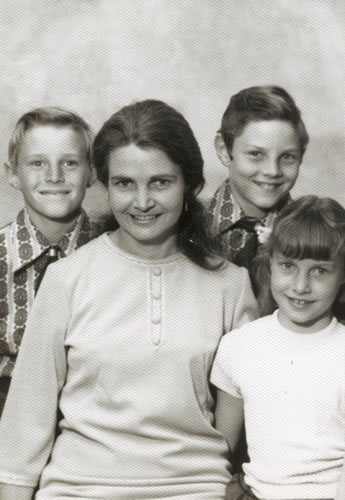
My brother, Clare and Roderick saw us off on the flight to Rome and took my car to lend to my exchangee for the year. We had a brief tour of Italy - I learnt to drive Italian style in the impossible Rome traffic - we wondered at the extraordinary Pompeii which gave a vivid illusion of being able to step back 2000 years - and revelled in Florence and Venice - we arrived in Bonndorf for Christmas with snow a metre deep. Bill's parents had come back to the village and Vati was a patient, devoted, full-time carer for his wife, who was getting more and more vague. Tante Gret looked after us like royalty. The family had been unable to make contact with Bill, but was pleased to see us and thought the children were lovely. Twelve years after my first visit, milk was still collected from the farm at the end of the village which had changed little.
On arrival at the house in Brookfield Ave, Larkfield, Kent we found the brooks, larks and fields completely absent. I contacted an agent who brought a Volkswagen camper van for me to inspect and which I bought.
I was required to enrol with a local doctor. The National Health Scheme was applauded by some, but described by others as "a fleet of ambulances at the foot of a cliff, instead of a warning sign or fence at the top." I believed in looking after my own health and that of my children.
There was a different approach to teaching, more individual work, as classes were smaller and there was an excellent teachers' aid. At first I felt overwhelmed by the differences. At this school which was very new and not yet officially opened I saw art in the other rooms was more creative and experimental than I was used to. Every room except mine had bright, colourful and original examples of five-year-olds' handwork. By comparison mine was stereotyped and unimaginative. It had never occurred to me to allow the children to paint flowers or butterflies or anything else on the windows. England was experimenting with a new style of "phonetic" reading and I had to relearn to read, using a phonetic alphabet as well as many other things new to me. The children wrote much more imaginative stories from their earliest days at school but were less used to outdoor activities and had to learn to climb an indoor climbing frame which terrified some of them.
My headmistress, after a moment's thought translated my expression "sticky beaks in the hat room" to "nosey parkers in the cloak room". I found out that "Durex" was a contraceptive not sticky tape and we needed to learn that "plimsolls" would be worn indoors by the children instead of "sand shoes" and "rice bubbles" were disguised as "rice crispies".
Peter was placed in a selective high school in Maidstone, where he had to catch up on French (with my help). His Technical Drawing was done as part of his homework and posted to the Correspondence School in Sydney. David and Jacqueline came with me and attended Thamesview Primary. They all escaped the phonetic alphabet and used ordinary books in Traditional Orthography (TO).
In the school holidays we again visited the family in Germany. I also made a point of taking the children to a village 60 miles east to meet their natural grandfather, who had married and was widowed but had no other children. He was extremely delighted to meet us and insisted on an address so that he could keep in touch. We toured on the continent in our camper van, of course went to Lauterbrunnen, experienced many foods, cultures and scenery. I was glad that the children were receptive to new things and were not hooked on consumerism. In the long summer holidays we travelled to Bonndorf again, discovered the wonderful five-year old Legoland in Denmark, persuaded by Peter who had seen it on a brochure, and as far as southern Norway. During other breaks we saw a lot of England and something of Scotland (The Far Cuillins of my childhood musical memories and Dumfries where my ancestor William Kinny was born) and Wales on shorter trips. The children found plenty to interest them and Jacqueline who was very sociable made lots of "friends" wherever we went.
The complete story of the our year in Europe can be found here.
I was becoming interested in my family's origins in Britain and we visited the districts of their births. Also I was more aware of conservation issues to do with the built and natural heritage and realised that Australia had a chance to avoid problems other countries were experiencing especially overpopulation and pollution. The population of Australia had doubled in my lifetime and much of the bush I loved was disappearing under concrete. Most Australians did not appreciate this, were unaware of how this loss can creep up, not having the wider perspective. Australian biology had evolved over millions of years with far more diversity than Europe where a large part had only evolved since the last Ice Age. Recent advances in archaeology and geology were daily revealing more detailed and accurate knowledge of prehistory.
During 1973 Grandma Kinny died aged 96. Her sister had lived to the age of 100 and Grandma had seemed indestructible. I had thought she would surely still be there in a nursing home on our return. Clare had developed a cardiac problem. Bill had an idea of putting another storey on their house in the Blue Mountains. Dad and Dot were living at Mudgee and Dot had developed terminal stomach cancer. Dad started to remodel his caravan for one person and planned to go travelling but did not get far, ending his days in a nursing home in Mudgee. Unfortunately Ernie, who had married a widow with a grown up daughter, and Norman who had argued years before over work, had a serious falling out over the sale of Grandma's house and other things. Family disunity.
On our return from Europe, we were met by my brother, Clare and Roderick with both cars. Life in Australia seemed to be static except for the staggering rise in inflation. My tenants vacated as arranged. I had to go to court again to get the property settled as nothing had been done about it. In the second hearing I got an even more favourable ruling which greatly displeased Bill. The property would be put up for sale, the unfinished house at a bargain price for someone prepared to see it as an investment worth some energy, time and money. Both properties sold readily. When the sale was finalised I was able to get a bank loan in my name and buy another place, not far away so that the children could maintain the same friendships and attend the schools where they were now settled. Unfortunately bank interest was very high (9.75%) but I was used to budgeting and was determined to have my own home. We chose a house which happened to have a rumpus room and a telephone line, so I took advantage and got the phone put on, 712469. Luxury! This felt like home. MY HOME. We saved and decorated according to our own tastes and put in some more native plants. And I bought better quality beds.
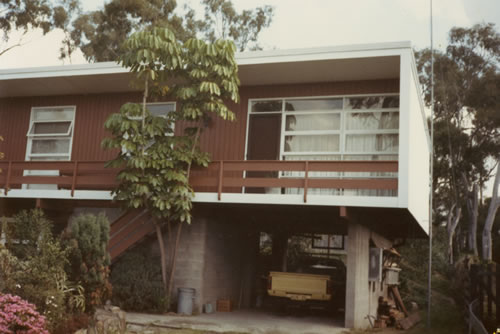
The house at Farmborough Heights
Mutti had never heard from her eldest son and soon after our return, she died. If I had not made the effort to go to Europe, the children would not have seen her and I would have regretted it. The achievement was very satisfying and confidence-building, knowing I could do it and did not need a wealthy man. It had been from my own effort and ability. I was "the maker of my own fortune".
In 1973 the government provided a lot of money for schools which HAD to be spent and a lot of equipment such as tape recorders was bought. They lacked suitable tapes and were a mystery to the average person at the time so nobody used them. I saw an enormous waste sitting in the storeroom.
Teaching in Australia I now found to be restrictive and I tried to be more flexible within the limits. Bigger schools were getting a secretary and some also had a teachers' aid as well. Classes were smaller but many teachers still taught as we had done with 45 in a class. When I was appointed to a school for handicapped children I had no close supervisor and was able to experiment and be quite free and could give impromptu lessons as the occasions arose. I bought blank tapes and experimented with the tape recorder editing and taping a record to suit for Open Day. Using the natural physical characteristics of the children in casting, I produced "Peter and the Wolf", for a concert, enlisting the aid of the parents for the costumes, resulting in something which made the children feel quite special. The music of the day was ABBA and I was as captivated as everyone, especially by "Fernando".
Some children had inherited problems in at least two generations, others had a temporary disability due to an illness or accident. Each of these children had a special government allowance which was not always used for the child's benefit. Others had every possible care and support from their families. One family had three of their four children suffering from a known genetic disorder, condeming them to a short, painful life. Was it fitting that families who knew about a genetic problem and had no religious conviction about contraception, were reproducing without responsibility, were spending the allowance on unhealthy takeaways? Was it fitting that the taxpayer was supporting, even encouraging them, when there were procedures which could limit the impact and number of children brought into the world with a known severe defect?
The study of genetics developed rapidly and dramatically in many areas, so that the ancestors of any plant or animal could be identified, with serious implications for biology and forensics. We can often trace our own genetic inheritance for millions of years and our genetic connection to all other living things.
And a meaning for life? I had found none except what I made of it. I was just part of evolution and not very different and no more important than an ant or a fern. I just WAS, a product of chance genetics. This life was all there was. If I chose I could grab what I could and enjoy momentary pleasure in consumerism or I could "tread lightly on the earth" and find a way of getting more lasting satisfaction from my time. I didn't need a stated meaning or unquestioning faith to find life intrinsically rewarding. I was free to give back as much as I chose, feeling it had to be no less than I took from my world. And I was free to question any aspect of existence and to change my opinion, to vary my way of reacting, to accept that some things are unfathomable.
There followed several relationships for me, some tentative and short-lived, others ongoing for a period, but none really enduring until in 1977 I met (at a dance, where else?) and married a man with whom I shared environmental interests and antipathy for rampant commercialism. Characteristically Ian whistled cheerfully at work, at home and whilst walking in the bush. The future directions of my life were set. He liked my children, all now over 14 and on their way to maturity and independence and they admired and liked him. They were not perfect, any more than I was, but I knew I had done the best I could in bringing them up.
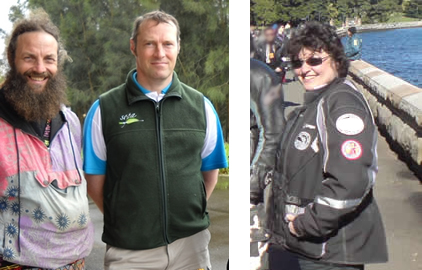
Peter, David and Jacqueline
Ian and I nearly shared a birthday [Feb 9 & 12] although he was six years older and one year celebrated with "La Traviata" at the Sydney Opera House. I introduced him to cryptic crosswords, and we put our combined brainpower to compute that "not quite gold team from the butcher" = silver side. Ian was knowledgeable about timber and trees and a keen bird-watcher and we enjoyed a journey of discovery together to O'Reillys, Tasmania, and a coach-camping trip to Kakadu and the Red Centre. We shared a wealth of travel and other rewarding experiences, including a cruise along the spectacular coast of Norway into the Arctic Circle in midsummer, Lauterbrunnen, the Black Forest (where he met Tante Gret) and especially Scotland, his birthplace. Highlights were the Hebrides for the Callanish Standing Stones (at an age of 3000m years, the oldest stones in UK), the Cuillins of my childhood, Shetland and Orkney for prehistory and geology. We investigated my roots in Ireland, my convict ancestors in Tasmania and saw what we could of the areas they had left, willingly and unwillingly. Of my sixteen forebears, all had arrived in Australia between 1824 (a convict), and 1852 (a ship's captain), so I was "dinkum Aussie".
Our travels were generally of the less expensive and leisurely kind - in a Campervan - with no envy of the opulence or luxury indulged in by others. We were much more in touch with the real people and the real places and real life, seeking depth rather than breadth. If a "wanderer's life is free" is not exactly true, but it can be achieved without enormous expense.
We agreed there were too many people in the world, too many of them were greedy consumers, expecting, demanding miracles from medicine and government, encouraged by "advances" in science. Man was the only animal which reproduced in uncontrolled numbers, had inexhaustible selfishness, supported dependent members and was often degrading his habitat. Most families were smaller but houses were bigger. It was communal suicide. Our charity donations went more to "Save the Bush" than "Save the Children". And we reduced our meat consumption, for a healthier diet and realising that it costs more to the environment to produce. I had no problem about people having great wealth so long as it was well-spent and created employment which was not destructive.
A lot of well-meaning effort was spent counter-productively. It did not solve anything, often created a greater problem. Feeding starving people in a drought-prone country led to greater population and when the next drought came, to a heavier population pressure and even more devastation. Certainly Australia could not and should not try to solve the world's population problems. When Don Chipp started the Democrats, Ian and I attended a meeting and I thought I had found a political party I could support. A similar story with the Greens. We even joined. Although they were unsuccessful in saving Lake Peddar, the Australian Heritage Commission formed as a result. Ten years later there was an even bigger move to save the Franklin and Gordon Rivers. The naturalist David Bellamy was involved, it was on colour television and the battle was won. Then The Greens began to promote issues we did not agree with and the old problems raised their ugly heads.
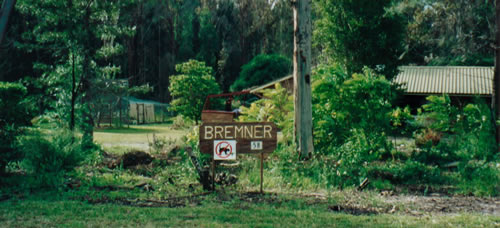
Battunga Drive, Tomerong
On retirement, by pooling our resources, Ian and I built, debt-free, a simple but comfortable house together on a few bush acres in the country using passive solar principles, with a solar water heater and a rainwater tank. It was in both our names. We developed a chemical-free garden, grew vegetables and fruit trees and native plants to bring native birds. Having time, we became involved in the local museum, (he did carpentry work and general maintenance), the Australian Plant Society, U3A courses and genealogy which offered other challenges and lots of social activities which often included dancing. I even learnt to sleep better. We did not imagine we could solve the world's problems, but knew we could set an example by the way we lived and that we had contributed more to society than we took. This gave a meaning to our lives. We did not need religion or material goods for happiness. We had gained the serenity to accept what we could not change. We worked to leave our little piece of the earth in better shape than when we bought it and were prepared to take responsibility for our own health and welfare (within genetic and other limits) and not blame others for our mistakes or omissions.
"Yet I thrive and the pals I meet make it good to be alive."
Happiness. Contentment. Satisfaction.
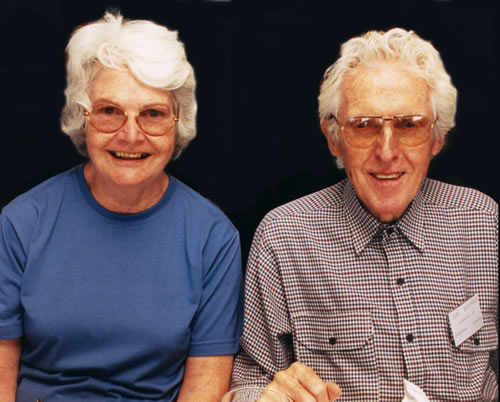
Dorothy and Ian
We had a close and mutually trusting relationship which lasted twenty-five years and enriched my life until he died of cancer in November 2002.
A good marriage WAS possible! There was a man for me who liked me, did not want to change me and would be sadly missed. "The memory will stay". Endless shared, precious experiences. No regrets - except at unguarded moments.
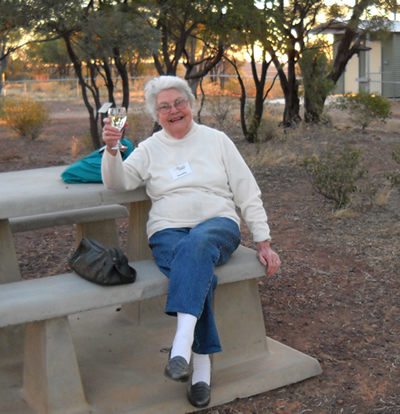
This photo was taken just weeks before Dorothy passed away
NEXT >>


 The house at Farmborough Heights
The house at Farmborough Heights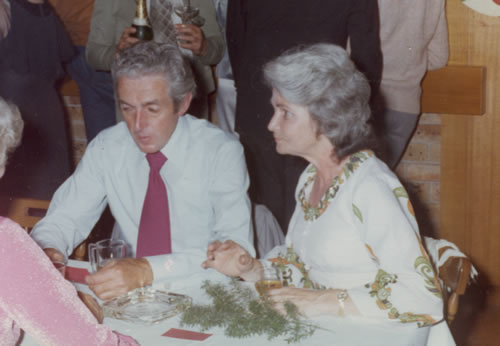
 Peter, David and Jacqueline
Peter, David and Jacqueline  Battunga Drive, Tomerong
Battunga Drive, Tomerong Dorothy and Ian
Dorothy and Ian This photo was taken just weeks before Dorothy passed away
This photo was taken just weeks before Dorothy passed away



